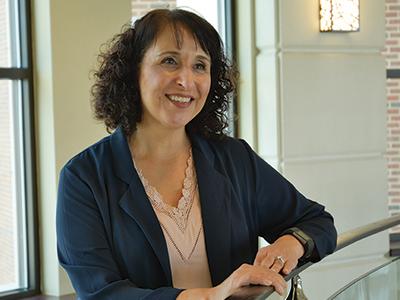As a young woman, Raquel Reynolds didn’t think college was in her future. She had begun a pre-med course after graduating from high school, but had to take a break after a series of personal tragedies. She left Austin and began waiting tables in a restaurant in Oklahoma. It didn’t seem likely she would return to college.

“Fortunately, one of the owners took an interest in me,” Raquel said. “And because she was a registered nurse, she encouraged me to look into nursing school.”
The closest community college was in Tishomingo, Oklahoma, a 40-mile drive away.
“Once I started, I couldn’t believe it. I loved everything about nursing,” she said. With her associate degree in nursing in hand, Raquel went to work in a hospital, but in the back of her mind she thought about continuing her education. After nine years as a nurse, she enrolled in the associate degree in nursing to BSN program at UT Austin School of Nursing, where she was surprised to find her ideas about the things that affect a nurse’s daily practice begin to change.
“I didn’t really have a chance to think about the ‘big picture’ when I was a bedside nurse,” Raquel said. “In the hospital, you’re focused on caring for patients and what’s in front of you.”
Hungry for more, she immediately entered the School of Nursing’s Master of Science in Nursing program. As she explored the many options advanced practice registered nurses (APRNs) have, her perspective shifted once again and she looked for opportunities to interact both with patients as an APRN and students as a teacher.
One day while at the School of Nursing a former professor suggested she apply to teach there.
“It wasn’t long before I was called in to cover for a faculty member, and I never left!” she said. “It was the best thing that ever happened to me. As I taught adult health to seniors, it dawned on me: This is what I want to do!”
Raquel entered the doctoral program five years later and afterwards began teaching at Texas A&M Health Sciences Center in Round Rock, Texas.
“I try to impress on my students how much there is to take into consideration about the individual we’re caring for: their family, history, obligations, social issues, problems,” she said. “All these surrounding issues need to be considered, alongside the daily routine care. All of this must come into your practice. I love to see that dawn on students. I tell them, ‘Yes, you want to be safe when giving medication; do it right. But take into consideration: Why is it happening in the first place? Can they afford the treatment? Will it change the way they do things?’”
Sometimes, she said, students come in with the idea that nursing is easy and they already know everything there is to know.
“I have to help them reframe their thinking without shutting them off. You have to be very direct and break down any preconceived ideas. It isn’t easy.”
Raquel also counsels them about the hard work that lies ahead.
“If you do it right, it’s going to be difficult. There are a lot of nursing programs out there that are easy to complete, where you can get a degree but not an education. At UT Austin, I had to learn every step of the process. I came out with a totally new way of approaching problems and coming up with solutions. You’ll never think the same way again, but it’s completely worth it.”
One of Raquel’s favorite things about being a nurse is seeing human beings at all stages in life: in happiness, in grief, the whole gamut.
“It’s a gift to be able to interact with so many people in so many different situations. If you pay attention and keep an open heart, you learn a lot. You learn about people, about humanity and about yourself.”
Raquel recently moved to Boston where she is an assistant professor at Massachusetts General Hospital Institute of Health Professions, College of Nursing, teaching prelicensure and DNP students.